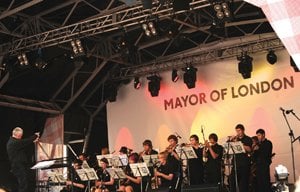High notes
Ginny Greenwood on a new scheme designed to boost musical opportunities for young people

Despite gloomy predictions earlier this year, there is good news that funding for music education has not been cut, and we have seen a positive response to the independent review of the state of music education by Darren Henley, the head of Classic FM (AP232). All this has given a much-needed injection of support to those teaching music in the UK. At the same time, however, it is clear that we cannot be complacent. There are many gifted young musicians who still do not have the opportunity to progress because their families cannot afford to continue their lessons or they cannot afford instruments. This is especially sad when you consider Britain’s incredible record of musical talent – from Britten to The Beatles and Simon Rattle to the Lloyd Webbers, we live in a country that has produced some of the finest and best-known musicians in the world.
A few weeks ago, musicians and composers joined the Mayor and some of London’s philanthropists for a reception to launch an initiative aimed at increasing musical opportunities and education for young people across the capital: The Mayor of London’s Fund for Young Musicians (MFYM). It is a charity, independent of the Greater London Authority, and will identify talented and committed children for whom financial and other constraints create a barrier to ongoing study, providing them with progression and development opportunities.
The plan is to offer at least 200 scholarships per year for 7- to 11-year-olds for up to four years, providing access to musical instruments, small group instrumental tuition, regular performance opportunities, individual mentoring and progression opportunities. In addition, there will be funding for partnerships between London’s professional musicians and local authority music services, providing thousands of 7- to 18-year-old musicians with musical development.
The new plans are born out of the Mayor’s Music Education Strategy and a comprehensive review of London-wide music provision undertaken by the Institute of Education. Parents and educators have long recognised the difference that music can make to the lives of children. They know that music-making develops the mind and the personality in an extraordinary range of ways: improving powers of concentration, self discipline, hand/eye co-ordination, mathematical and listening skills, sensibility, sense of pitch and rhythm, and artistic performance and appreciation. They also know that group music-making has a capacity to encourage teamwork because groups strive for excellence in a non-competitive environment with a heightened sense of community. In independent schools, 50% of children receive weekly instrumental lessons. Sadly, the equivalent proportion of regular instrumental learners in the state sector is 8%, despite 80% of children saying they would like to learn an instrument. It is safe to assume that amongst children from socially disadvantaged backgrounds the percentage is significantly lower.
MFYM has also been inspired by the Mayor’s calls for bankers, financiers and other privileged individuals to use some of their wealth to the benefit of the wider community. Over the next year we will be working closely with these founder benefactors, not only to engage them more deeply with the charity, but also to encourage them to identify other potential benefactors to support MFYM’s £2m Appeal.
Some are fearful about the perceived drive to increase philanthropic giving as a panacea for shortfalls, or even as a longer-term replacement for public funding but I am not sure that is a reality. Though not without its own idiosyncrasies, the UK model of mixed funding remains remarkably effective and dynamic in its ability to support a wide range of artforms and wide participation by the public.
However, there is an acknowledgement that the public purse is simply not deep enough do everything, which inevitably impacts on the provision of music education and musical opportunities for young people. While MFYM is not a fund for identifying and nurturing a handful of future world-class performers, it will address the imbalance in the huge and often neglected middle ground. Given the UK’s record for producing international stars, who knows what we future talent we may uncover.
Tina Mermiri1 has noted that private investment accounts for 15% of income for the arts, with 55% of this down to individual giving, but that more can be done. Absolutely right, especially in a city like London where an enormous number of high net worth individuals are based. They are not here just because they can make money. One of the great attractions is the eclectic cultural life and amazing creativity of our capital. These are assets that need to be nurtured and invested in.
Over the next year we will be lobbying wealthy individuals, their companies and private foundations, so that we reach our target as soon as possible. Only then can the serious work begin.
Join the Discussion
You must be logged in to post a comment.